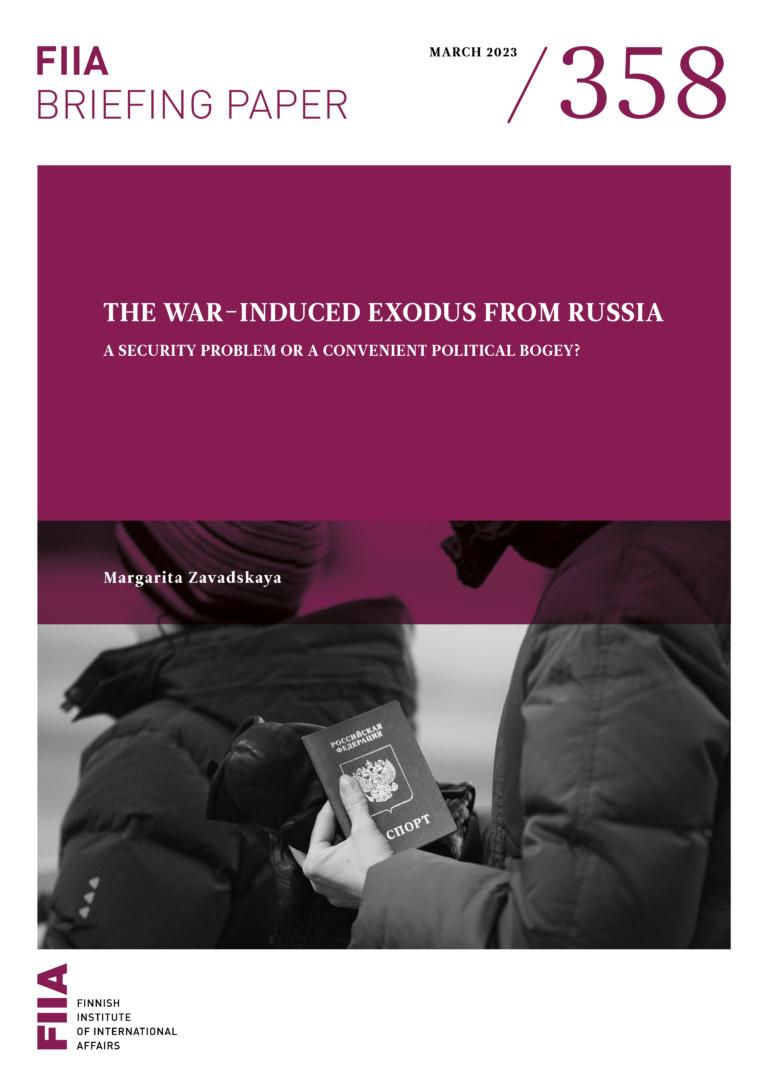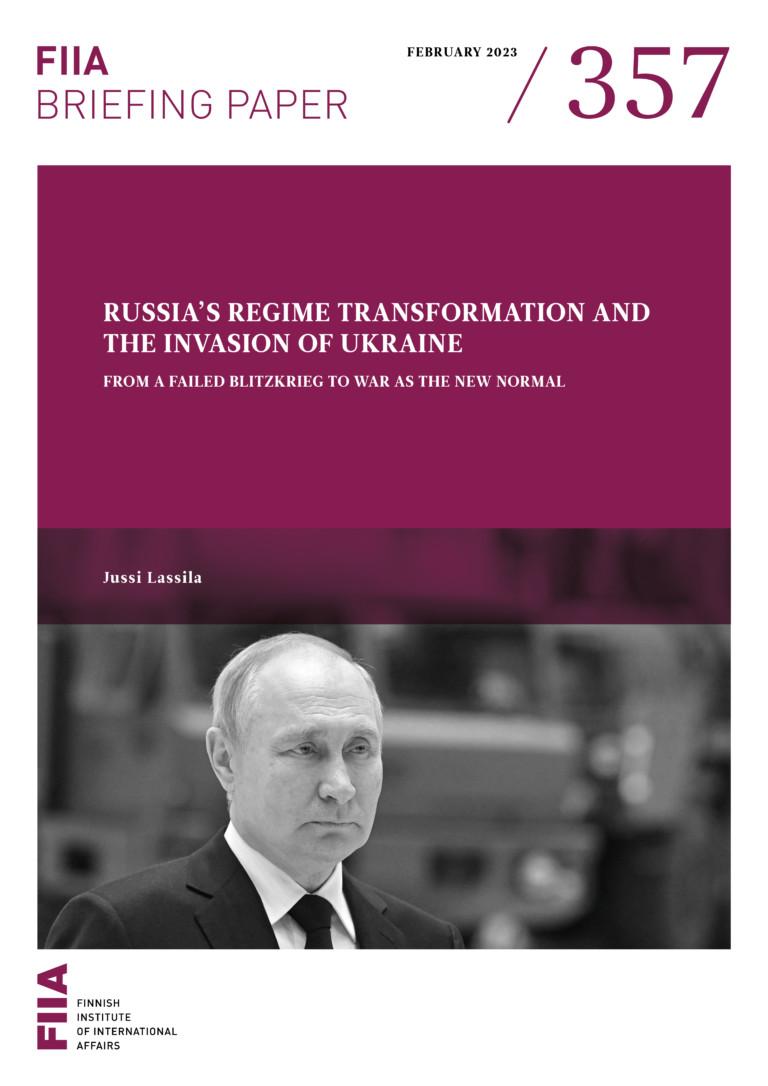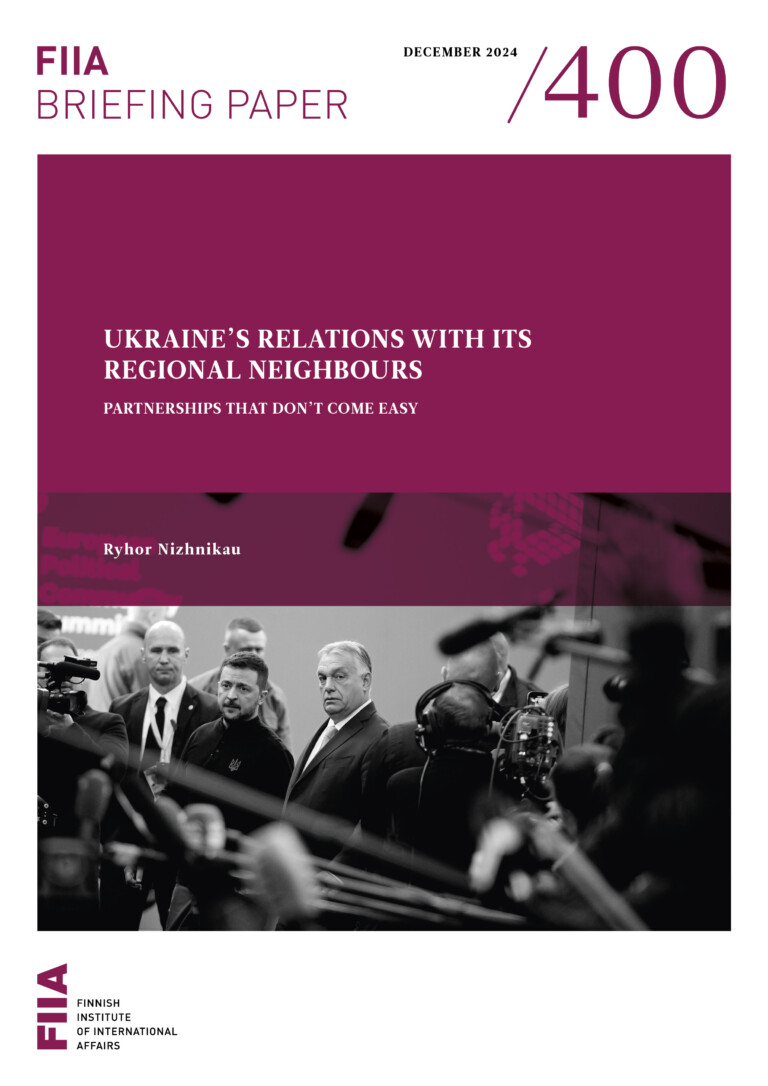Vladimir Putin’s system is built on risk-averse loyalty and needs informal actors who can compensate for the inefficiency of official actors and partially satisfy the regime’s ambitious geopolitical visions.
In Prigozhin’s mutiny, the same factors that had protected the regime’s integrity and deepening autocracy turned out to be vulnerabilities. The elimination of Prigozhin does not resolve this structural weakness but only shifts the problem elsewhere.
Private military company (PMC) Wagner operated in Ukraine as an autonomous unit of the Russian army with more discretion on the ground and certain organizational advantages. However, PMCs should not be seen as private armies, but as extensions of the bureaucratic army or attempts to produce “pockets of efficiency”.
The decentralization of armed groups weakens their ability to act against the political leadership. At the same time, this can be a ticking time bomb that critically weakens the state’s monopoly on violence.
Introduction
The sudden yet expected death of Yevgeny Prigozhin, the founder of mercenary group Wagner, marked the end of Wagner’s reign as the Kremlin’s most influential and efficient functionary of dirty operations. Prigozhin, also known as Putin’s chef, was killed when his private jet was brought down by an explosion on 23 August. It seems that the damage to Putin’s image and reputation caused by Prigozhin’s mutiny in late June was simply too severe to carry on as if nothing had happened, despite Wagner’s obvious benefits to the Kremlin.
On the one hand, the passivity of elites, authorities and citizens during the mutiny raised serious doubts about the strength and stability of Putin’s regime. On the other hand, the mutiny also raised the issue of the regime’s ability to keep its informal entrepreneurs – especially the violent ones – on a leash. Risk-averse behaviour, the loyalty of the state apparatus and the decentralization of armed groups have been central pillars of Putin’s power. In Prigozhin’s mutiny, these proved to be the main vulnerabilities.
This Briefing Paper addresses the political implications of Prigozhin’s rise and fall for the Russian domestic landscape. Prigozhin’s rebellion was not just a glitch in the system, but rather a manifestation of structural risks within the Russian regime. His PMC Wagner along with his personal assets, autonomy and the lack of direct supervision from the Ministry of Defence enabled underlying political risks.[1] After the de facto elimination of Wagner and its leader, it is unlikely that other PMCs would become a hotbed for disloyal patriotic unrest.
The paper starts with a brief discussion on the risk-averse practices manifested in Putin’s exercise of power, on which he has built his political irreplaceability. This is followed by an overview of Prigozhin as a political figure in Putin’s system and the activities during the mutiny. After that, the reception of Prigozhin among Russians and the political potential of an actor like Prigozhin will be examined. The paper argues that Wagner and Prigozhin-like actors have been instrumental for tasks that could not be performed by the ineffective state bureaucracy. At the same time, these unofficial and semi-official actors create political risks, as demonstrated by the June mutiny. After Prigozhin’s rebellion, Putin’s position will very likely be secured by further dispersing armed groups, which may, however, become a ticking time bomb and inflict harm on the state’s legitimacy.
Risk aversion leads to regime vulnerability
Despite Vladimir Putin’s Soviet-nostalgic, imperialist and anti-Western preferences, the polity inherited from Boris Yeltsin has not been changed. Rather, Yeltsin’s super-presidential governance, in which even the slightest potential threat to the president’s position must be minimized or eliminated, has deepened year by year.
Putin’s attitude towards Yeltsin’s dismantling of the Soviet intelligence and security monopoly of the KGB is an illustrative example. Despite his own KGB background and closeness to the security service elite, Putin has not reversed Yeltsin’s decision to split the former KGB into the FSB (responsible for internal security), the SVR (responsible for foreign intelligence) and the FSO (responsible for the president’s security). Rather, in securing his position, Putin divided the field of security authorities even further in 2016 by establishing the National Guard of Russia, led by one of his closest allies, Viktor Zolotov.
Putin’s public exercise of power is similarly characterized by risk-averse practices. Carefully orchestrated, hours-long press conferences and omniscient commenting on citizens’ concerns have been Putin’s trademarks for years. Instead of highlighting his image per se, these public rituals have underscored his irreplaceable position as the guarantor of formal institutions and laws.[2]
In this vein, throughout his reign, Putin has distinguished himself from those charismatic autocratic populists whose political profile demonstrates explicit superciliousness over official institutions and appeals directly to supporters. For example, both Recep Tayyip Erdoğan and Donald Trump have harnessed their supporters to secure the leader’s position or to openly rage in their name. In 2016, Erdoğan quickly mobilized his supporters into the streets to oppose a military coup attempt. Similarly, the takeover of the US Capitol in January 2021 demonstrated the level of fanaticism of Trump’s supporters.
As seen in the June 2023 mutiny, any spontaneous mobilization of supporters has been a completely alien notion to Putin. Instead, they are typically mobilized in a controlled manner with various carrots. These range from an extra day off for state enterprise employees to food vouchers given to pensioners for showing up at gatherings in stadiums and squares, or even for casting votes at polling stations. As for the time between these circuses, the main priority has been to keep citizens out of politics. In a similar manner, potentially beneficial coexistence with internal political opponents does not exist in Putin’s political imagination, which is characterized by weak political opponents who should either be co-opted, nullified, or excluded from politics.
Loyalty to the president is manifested, for example, in banal statements such as “Russia’s strength is not oil and gas, but Vladimir Putin”.[3] Such statements underline Putin’s irreplaceability as the guarantor of formal institutions. The Russian state’s budgetary power over the majority of economic and societal sectors keeps citizens disengaged. For individual members of the elite, the motivation to express loyalty stems from two sources: a good relationship with the president brings obvious benefits – but on the other hand, breaking the rules or showing other signs of disloyalty might lead to accusations of corruption.
Conversely, no attention is paid to the hidden assets of ministers or officials, as long as their loyalty is seen as credible. By the same token, loyalty is the primary way to gain access to the state’s assets, which are controlled by the president. Competition for loyalty is competition for material benefits and their preservation between members of the elite. This has guaranteed the ostensible unity of Putin’s elite, who are dependent on the president’s position.
Unconditional loyalty to the president has made it practically impossible for subordinates to effectively coordinate the implementation of presidential decisions. The primacy of loyalty at the expense of expertise[4] and the risk-averse sub-optimization of individual actors have practically torpedoed all official policy goals, including the diversification of the economy into high-tech innovations, the space programme or the ‘special military operation’ in Ukraine.[5]
Prigozhin as a risk enabler
Prigozhin and his private army Wagner rendered the phenomenon of private military companies (PMCs) a point of concern for both international observers as well as the Kremlin. First of all, the term ‘private’ is misleading, as PMCs are just a way of contracting mercenaries to operate in the interests of the Russian state. All PMCs have contracting relations directly with the Ministry of Defence, which makes them de facto another unit of the Russian army, only with more discretion on the ground and certain organizational advantages. It would be correct to view such groups not as private armies but as an extension of the army or its potential ‘pockets of efficiency’. These are specific areas or organizational clusters that are protected by privileged arrangements with the political authorities. PMCs are examples of such arrangements. So why did Wagner become the source of mutiny instead of other PMCs?
As Putin concentrated the country’s economic resources under his control in the early 2000s, two types of oligarchs became part of the Kremlin’s economic and political power. The first group was made up of those who became rich and exercised extensive autonomy in the 1990s, but whose options in the Putin era were limited to retaining a part of their wealth by submitting to Putin’s political control (Oleg Deripaska, Vladimir Potanin), going into exile (Boris Berezovsky, Vladimir Gusinsky), or being imprisoned (Mikhail Khodorkovsky). The second group was made up of Putin’s Leningrad-era friends (Igor Sechin, Aleksey Miller, Gennady Timchenko, Boris and Arkady Rotenberg), who were rewarded for their long-term loyalty.
Prigozhin was an outlier, as he did not belong to either group, even though he was from St. Petersburg/Leningrad. He accumulated his wealth by leveraging his criminal connections in the restaurant and catering businesses of the 1990s, providing services to the Kremlin. Thanks to this, he managed to establish deep connections within the government, especially the Ministry of Defence. With subsequent forays into the fake media business and the private army sector, he learned to anticipate the unofficial needs of Putin’s power, including trolling the Kremlin’s opponents, influencing foreign elections, and conducting covert military operations.[6]
Prigozhin managed to pull the right strings in an authoritarian system built on risk-averse loyalty, especially in terms of the system’s need for informal actors who can compensate for the inefficiency of official actors. If the president’s geopolitical visions require the restoration of superpower status, but the public resources and skills are insufficient to reach this goal, there is an obvious need for various covert actors and operations, whether in Russia, Syria, or Africa. Unofficial actors who are rewarded for their loyalty can also be an additional source of security for the president, as they can be used to limit the power aspirations of the official elites.
At first, Prigozhin was not needed for the full-scale invasion of Ukraine. However, along with the invasion’s poor progress, casualties and manning shortages, a position opened up for him, with consequences Putin did not understand or control. Whereas the official military leadership, frozen by the obligation of loyalty, has remained faithful to the official story regarding the ‘special military operation’, Prigozhin used his boorishness to his advantage by commenting on the reality of the front lines, which had become public.
Prigozhin’s understanding of social media, and the militaristic mood surrounding it, proved useful. For example, he made heavy use of the messaging service Telegram, which has exploded in popularity during the invasion at the expense of the Kremlin’s television propaganda.[7] Prigozhin’s blunt outspokenness was given added credibility by the growing frustration of militarist circles with the Kremlin’s lies about the progress of the operation. While officials were trying to construct a success story, the situation at the front was in fact becoming more critical, which led to Prigozhin gaining respect.
It is unclear how much Putin knew about Prigozhin’s brash criticism of the Ministry of Defence and operational military command before the mutiny. In Putin’s system, subordinates are not encouraged to be honest with their superiors about problems or achievements, so it is reasonable to assume that Putin’s picture has been incomplete. The president was very likely lulled into believing that Prigozhin would bow to his imperious demands and ultimately submit Wagner to the control of the Ministry of Defence. He may also have trusted that Prigozhin’s reputation for brutality and lawlessness would limit his opportunities to increase his influence beyond the battlefield.
In the rebellion fomented by the prolonged and unsuccessful war, the factors that had previously protected the regime’s integrity and deepening autocracy turned out to be weaknesses. In Putin’s system, individual ministries or ministers do not have the opportunity to profile themselves as genuine authorities alongside the president – let alone act on their own initiative in cooperation with other authorities, particularly in a rapidly developing situation. Instead, the system encourages inaction while officials and ministers avoid any risks to their own position. The system showed its vulnerability in the face of an ambitious, well-resourced and networked armed actor. The elimination of Prigozhin and his armed group hardly resolves this structural weakness, but merely shifts the problem of autonomous actors and the system’s inaction elsewhere.
The Kremlin’s recent decision to allow the governors to establish their own armies should be viewed as an attempt to create more loyal ‘pockets of efficiency’ and avoid the sort of risks caused by Prigozhin and Wagner. According to the head of the State Duma defence committee, Andrey Kartapolov, military units will be “specialized state unitary companies that on the decision of the Russian President can be established to protect public order”, and they will be used “to protect state borders during mobilization, as well as in conditions of martial law and war”.[8]
Crucially, the units will enjoy extensive authority and face few consequences for their actions. For instance, members of the new forces will bear no responsibility for moral, physical, or material damage inflicted, and citizens will have no right to oppose their demands. However, the National Guard’s supervisory role in the creation of these gubernatorial PMCs suggests that the ultimate purpose is to expand its powers against potential threats from the army and the Interior Ministry.[9] After all, the National Guard is known as a fiercely loyal Putin ally. At the same time, this decision can be viewed as a cost optimization strategy regarding the ongoing war, as governors, regional businesses (and their coffers) become co-sponsors of the military draft and are expected to fill the gaps in supplies and equipment.
Popular support for Prigozhin-like figures
The June mutiny raised the broader question of whether there is a demand for politicians like Prigozhin. Limited evidence from surveys gathered in Russia suggests that there is some support, although the numbers are low. According to the Levada Center polls, Prigozhin’s support declined from 58% (fully support and somewhat support combined) on the eve of the mutiny on 22–23 June to 29% on 25–28 June.
There are many reasons for the low numbers. Some former supporters may have sincerely deemed Prigozhin a traitor, while others may have been disappointed by his failure: 34% expressed disapproval because of the mutiny and treason as well as political backstabbing; 8% claimed that he went too far and his ambitions fell short; 8% believed him to be arrogant, aggressive, and having a repulsive appearance; and 7% claimed that he was a murderer, a sadist, a fascist or a war criminal. Before the attempted military coup, 19% of respondents said that they would be ready to support Prigozhin if he took part in the 2024 presidential election. After 24 June, the proportion of such respondents halved to 10%, which echoes the twofold decrease in his credibility regarding other issues.[10]
According to the data of the Open Minds Institute, Prigozhin did garner significant interest, but most Russian respondents still viewed other politicians as more suitable candidates for the presidency. Only 21% of Russians believed that Prigozhin was ‘capable’ or ‘somewhat capable’ of governing Russia. Gender, age, level of education, federal district, and type of residence did not seem to have a significant impact on Russian sentiments towards Prigozhin.[11] Thus, his popularity should not be overestimated, as it proved to be short-lived.
Nonetheless, it must be noted that relying on opinion polls may be misleading, as they usually do a poor job of predicting abrupt political changes, and tend to reflect an inertial image of society. There is no guarantee that such radical groups would not gain political support at any critical juncture. The Russian electoral landscape has remained a black box for decades, since no truly competitive elections have taken place since 1999 and the real distribution of voter preferences is unknown.
On the other hand, one might suspect that political figures that share a strong anti-elite sentiment and express compassion towards ordinary people and soldiers might gather support among Russians. Such ‘wartime populism’ has a certain potential, which is likely the reason why the Kremlin strives to pre-emptively hedge these risks by eliminating political challengers, even die-hard patriots. Igor Girkin, better known by his nom de guerre ‘Strelkov’, gained support among Russian ultra-nationalist groups as a former spy and soldier in eastern Ukraine and a veteran of Donbas. He attracted the Kremlin’s attention by heavily criticizing the government and Putin personally. Girkin also created the so-called ‘Club of Angry Patriots’, a nationalistic organization famous for criticizing the Russian government for its inability to win the war it had started against Ukraine. In July, he faced criminal charges for inciting extremism.[12]
After the anti-regime and anti-war opposition was eliminated in the months following the invasion, the domestic niche of public ‘critics’ and ‘opposition’ was occupied by nationalist groups. Their main antagonists are ‘loyal conformists’, for whom loyalty to the Kremlin is more important than Russia’s victory. After the smooth elimination of Prigozhin and his private army – as well as the arrest of Girkin – there is more room for accumulated grievances and discontent among those who bear the costs of the war. Russia’s exiled opposition may even see such groups as tactical allies, as did Mikhail Khodorkovsky when he urged support for Prigozhin’s rebels. However, such alliances are highly problematic for both sides and therefore remain unlikely.
A protracted war, a deteriorating economy and loss of trust in the Kremlin can stir up resentment, paving the way for more radical political groups. However, it is unlikely that the challenge to Putin’s regime will come from conservative groups or ultra-patriots. Rather, the most likely form of protest would be an increase in soldiers deserting the battlefield and expressing reluctance to continue fighting. Prigozhin’s elimination, however, demonstrated the regime’s inability to effectively address the discontent resulting from the war within its political framework. Putin’s repressive apparatus does everything in its power to play down dissenting figures while securing the president and the economic interests of the elites dependent upon him. What remains is an increasingly totalitarian fostering of consensus and a government that imprisons or eliminates its critics.
Conclusions
The Putin regime represents a personalist dictatorship, where the president operates as the coordinator and guarantor of elites’ personal wealth in the inefficient state bureaucracy. As long as he is able to carry on with these tasks, he will enjoy support from the inner circle and remain in power. Russian regional elites, including ethnic republics, also have access to perks and privileges offered by Moscow that undermine their political agency and ability to stage any revolts. The concentration of economic power and armed units (the Armed Forces, the FSB and the National Guard) remains high, and the regime, despite its clumsy reaction to Prigozhin’s ‘march of justice’, is capable of protecting itself.
Moreover, the vast majority of the Russian population are depoliticized and prefer to abstain from any form of political engagement, let alone involvement in armed rebellions. During the mutiny, most citizens took a wait-and-see approach without making any risky moves. The same applies to the Russian military and bureaucrats, who appeared passive and risk-averse. As of now, there are no preconditions for civil strife in Russia, as there are no elite challengers to the regime with the capacity to gather sufficient support and arms.
The Wagner Group appeared to have the capacity to challenge the regime. The issue was not so much a lack of support for Wagner, but the passivity of the elite and society towards such an actor. Without any shifts at the elite level, change is not possible.
While the Russian regime counts on political disengagement, it never relies on patriotic zealots and only uses them as disposable instruments. Prigozhin was one of these instruments. The backbone of the regime is still comprised of risk-averse bureaucrats with economic beneficiaries at the top levels. Reliance on risk-averse and less entrepreneurial (and often professional) cadres renders the regime vulnerable and forces the leadership to create ad hoc ‘pockets of efficiency’. PMCs and Wagner in particular used to be instrumental for those tasks that could not be performed by the state bureaucracy. However, such grey zone actors carry political risks, and the Wagner mutiny demonstrated the pitfalls of such ‘manual steering’.
The Kremlin’s solution to potential conspiracies by armed groups was to increase their number even further in order to undermine their ability to conspire against the leadership. This also lowered the costs of the leadership’s security, since these groups undermine the possibility of internal threats by competing with each other. Nevertheless, in the long run, such dispersion of legitimate violence may become a ticking time bomb and inflict harm on the legitimacy of the state itself.
Endnotes
[1] Margolin, Jack (2023) “The New Russian Mercenary Marketplace”. Ridl.io, 21 August 2023. https://ridl.io/the-new-russian-mercenary-marketplace/.
[2] Wengle, Susanne and Christine Evans (2018) “Symbolic state-building in contemporary Russia”. Post-Soviet Affairs, 34:6, 384–411.
[3] Chairman of the State Duma Vyacheslav Volodin. 12 March 2020, http://duma.gov.ru/en/news/48036/.
[4] Ora, John Reuter and Graeme B. Robertson (2012) “Subnational Appointments in Authoritarian Regimes: Evidence from Russian Gubernatorial Appointments”. The Journal of Politics Vol 74, No 4.
[5] Gel’man, Vladimir (2022) “The Politics of Bad Governance in Contemporary Russia”. University of Michigan Press.
[6] Dossier Center (2023) “Proshloye i budushchee Prigozhina”. Dossier, 6 July 2023. https://dossier.center/wagner-fall/.
[7] Pertsev, Andrey (2023) “Russia’s broken Television”. Riddle, 25 July 2023. https://ridl.io/russia-s-broken-television/.
[8] Staalesen, Atle (2023) “Russian governors could soon start building regional armies”. The Barents Observer, 27 July 2023. https://thebarentsobserver.com/en/2023/07/russian-governors-could-soon-start-building-regional-armies.
[9] Pertsev, Andrey (2023) “Putin’s head of guard”. Riddle, 5 September 2023. https://ridl.io/putin-s-head-of-guard/. Besides this role, after the mutiny, the National Guard was granted the right to use tanks and heavy weapons.
[10] Levada Center (2023) “Myatezh 23–24 iyunya v vospriyatii rossiyan”. Levada.ru, 3 July 2023. https://www.levada.ru/2023/07/03/myatezh-23-24-iyunya-v-vospriyatii-rossiyan/.
[11] Open Minds Institute (2023) “Public opinion analysis on Prigozhin a day before the coup attempt”. 24 June 2023. https://www.openmindsinstitute.org/reports/prigozhin-before-mutiny.
[12] Busvine, Douglas and Veronika Melkozerova (2023) “Pro-war nationalist and Putin scourge Igor Girkin held on extremism charges”. Politico, 21 July 2023. https://www.politico.eu/article/pro-war-vladimir-putin-critic-igor-girkin-strelkov-arrested-russia-ukraine/.






